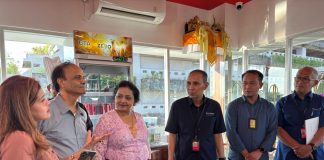Ondel-ondel are typical Betawi dolls and a popular icon of Jakarta. This pair of 2.5m tall and 1m wide giant dolls are often seen in office buildings, hotels, at Jakarta festivals, and Betawi weddings. Here are some unique facts based their history:
The Origin of the Word Ondel-Ondel
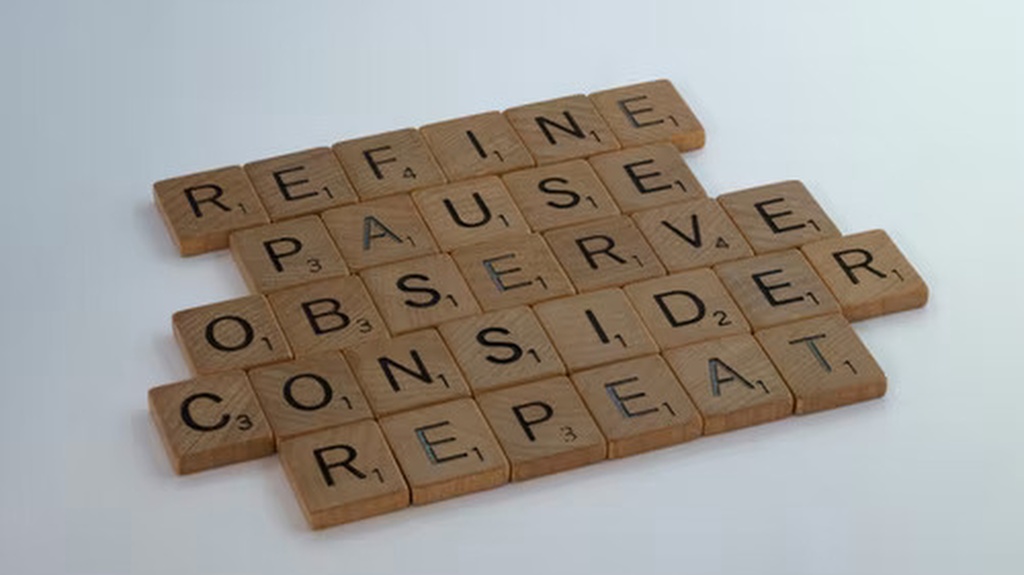 An arts and culture expert observed said that Ondel-ondel used to have the name Barongan like the Balinese Barongan (Barong Landung), the Central Javanese Barongan (Reog Ponorogo) and the Chinese Barongan (Barongsai and Liongsai). The origin of the term ondel-ondel maybe arose due to a mere play on words, where the repetition of the word ondel is repeated as it is a pair of dolls, and the nature of the Betawi people, famous for their style – speak plainly, but without clear meaning.
An arts and culture expert observed said that Ondel-ondel used to have the name Barongan like the Balinese Barongan (Barong Landung), the Central Javanese Barongan (Reog Ponorogo) and the Chinese Barongan (Barongsai and Liongsai). The origin of the term ondel-ondel maybe arose due to a mere play on words, where the repetition of the word ondel is repeated as it is a pair of dolls, and the nature of the Betawi people, famous for their style – speak plainly, but without clear meaning.
Ondel-ondel have been documented in 1605 by W. Scot, a trader from England.
Historical Significance of Ondel-ondel
 Traditionally, ondel-ondel were used to ward off plagues and crop failures. Ondel-ondel are paraded when there is a pagebluk (epidemic), famine, big celebration (Cap Go Meh, etc.) or after the harvest. The Ondel-ondel are usually in pairs, male and female dolls – namely Kobar for a boy and Borah for a girl. Kobar symbolizes humans having to make a living in this world, while Borah is a symbol of the afterlife, namely humans must always do good and remember God.
Traditionally, ondel-ondel were used to ward off plagues and crop failures. Ondel-ondel are paraded when there is a pagebluk (epidemic), famine, big celebration (Cap Go Meh, etc.) or after the harvest. The Ondel-ondel are usually in pairs, male and female dolls – namely Kobar for a boy and Borah for a girl. Kobar symbolizes humans having to make a living in this world, while Borah is a symbol of the afterlife, namely humans must always do good and remember God.
The female ondel-ondel is believed to be a manifestation of Dewi Sri (the goddess of fertility in agriculture). The Betawi people believe that the presence of female ondel-ondel can protect all crops. While the male ondel-ondel is believed to be the embodiment of bad things. That’s why male ondel-ondel face are scary.
The coconut flower on the ondel-ondel head means strength. The coconut tree has strong roots that all elements of its body can be utilized.
Special Rituals in the Process of Making Ondel-Ondel
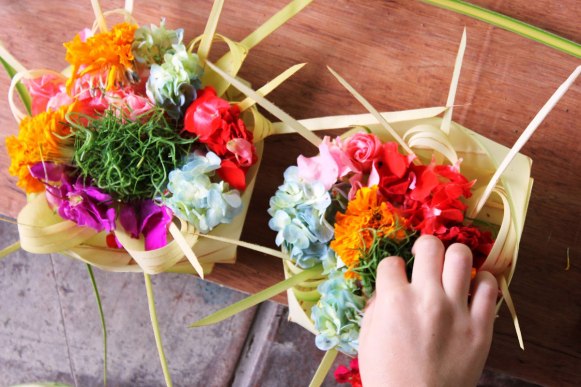 Because of its sacred nature, the making of these dolls is also very ritualistic. The face was traditionally made of wood, and must be placed in a sacred tomb for a certain period of time. It is believed that it is easy to connect with spirits with the mask. In addition, there are also special rituals such as mandatory jampe (mantra) reading. Offerings are made during and after the ondel-ondel parade in the form of coffee, flowers, and water.
Because of its sacred nature, the making of these dolls is also very ritualistic. The face was traditionally made of wood, and must be placed in a sacred tomb for a certain period of time. It is believed that it is easy to connect with spirits with the mask. In addition, there are also special rituals such as mandatory jampe (mantra) reading. Offerings are made during and after the ondel-ondel parade in the form of coffee, flowers, and water.
Music
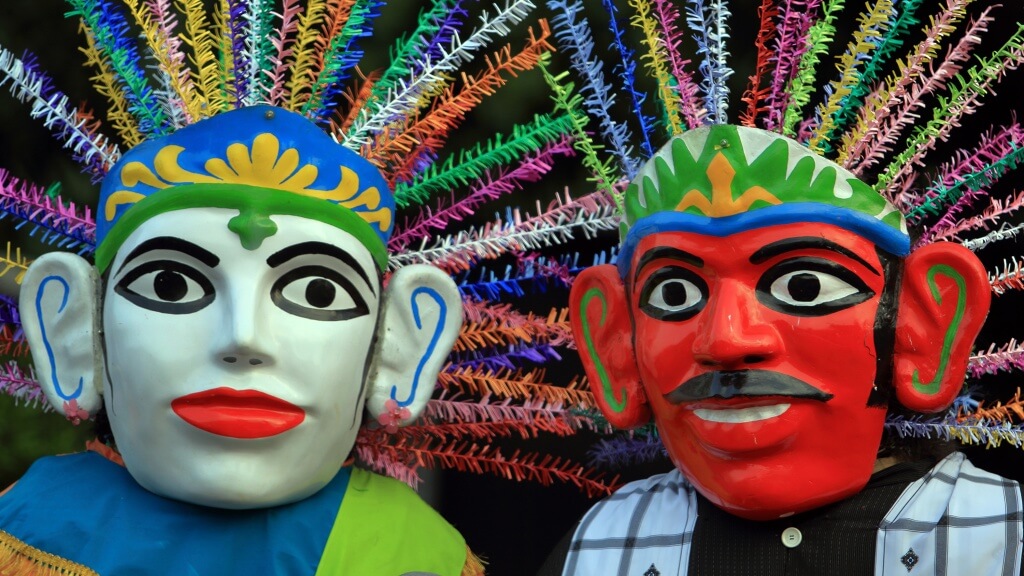 The music that accompanies the ondel-ondel is of the tanjidor, tambourine music, gendang pencak, gambang kromo and others. In addition to music, Ondel-ondel performances are usually performed like a folk parade. The Ondel-ondel do not stand still, but walk in a procession and dance. These days it is common to see ondel-ondel on the roadside with recorded music over loudspeakers.
The music that accompanies the ondel-ondel is of the tanjidor, tambourine music, gendang pencak, gambang kromo and others. In addition to music, Ondel-ondel performances are usually performed like a folk parade. The Ondel-ondel do not stand still, but walk in a procession and dance. These days it is common to see ondel-ondel on the roadside with recorded music over loudspeakers.
New Era of Ondel-Ondel
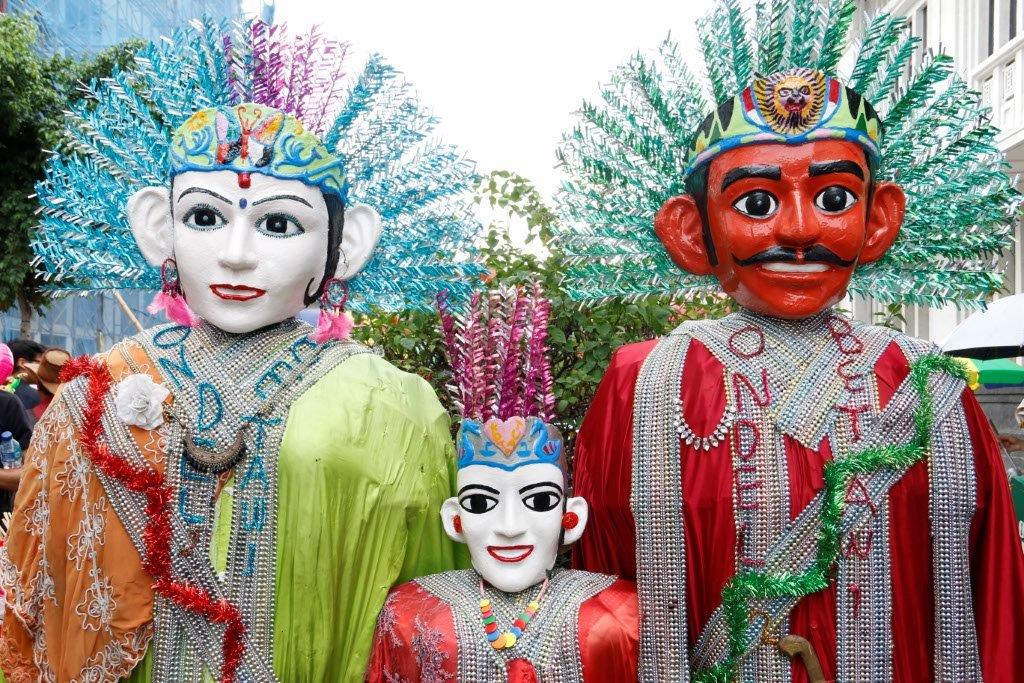 Currently ondel-ondel are presented more for entertainment events and no longer associated with its sacred function. They are no longer paraded around the village to bring relief from disaster, but at weddings or, most famously, at Jakarta’s birthday festivals, and sometimes by singing beggars.
Currently ondel-ondel are presented more for entertainment events and no longer associated with its sacred function. They are no longer paraded around the village to bring relief from disaster, but at weddings or, most famously, at Jakarta’s birthday festivals, and sometimes by singing beggars.
The ondel-ondel as an icon survives and adorns the face of metropolitan Jakarta.
Have you ever seen ondel-ondel? What was your impression when you first saw it? Please share in the comments section below.





